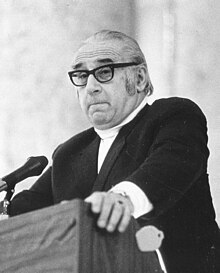Hans Weigel
- View a machine-translated version of the German article.
- Machine translation, like DeepL or Google Translate, is a useful starting point for translations, but translators must revise errors as necessary and confirm that the translation is accurate, rather than simply copy-pasting machine-translated text into the English Wikipedia.
- Do not translate text that appears unreliable or low-quality. If possible, verify the text with references provided in the foreign-language article.
- You must provide copyright attribution in the edit summary accompanying your translation by providing an interlanguage link to the source of your translation. A model attribution edit summary is
Content in this edit is translated from the existing German Wikipedia article at [[:de:Hans Weigel]]; see its history for attribution. - You may also add the template
{{Translated|de|Hans Weigel}}to the talk page. - For more guidance, see Wikipedia:Translation.

Julius Hans Weigel (29 May 1908, Vienna – 12 August 1991, Maria Enzersdorf) was an Austrian Jewish writer and a theater critic. He lived in Vienna, except during the period between 1938 and 1945, when he lived in exile in Switzerland. He was a lifetime companion of the Austrian actress Elfriede Ott.
Biography
During the time before the Anschluss of Austria, i.e. the annexation by Nazi Germany in 1938, he worked at Viennese cabaret theaters. After his return from Switzerland, where he lived in exile (1938 – 1945), he wrote critical reviews about theater plays for the Austrian newspapers Kurier and Neues Österreich. Jointly with Friedrich Torberg he was responsible for the boycott in Austrian theaters of Bertolt Brecht whom he rejected because of Brecht's communist convictions.
Between 1951 and 1954, Hans Weigel edited the anthology Stimmen der Gegenwart (Voices from the Present), which fostered young writers. Today, his name is used by the Subsidy for Literature of Lower Austria. Weigel adapted comedies by Johann Nepomuk Nestroy and translated Molière. He collaborated with the annual Nestroy Theater Festival on Burg Liechtenstein, whose art director was Elfriede Ott.
Awards and accomplishments
- 1972: City of Vienna Prize for Journalism
- 1977: Johann Nestroy Ring
- 1982: Ehrenring by the City of Vienna
- Austrian Cross of Honour for Science and Art, 1st class
Works (selection)
- Lern dieses Volk der Hirten kennen. Versuch einer freundlichen Annäherung an die Schweizerische Eidgenossenschaft. Zurich: Artemis 1962
- Karl Kraus oder Die Macht der Ohnmacht. Versuch eines Motivenberichts zur Erhellung eines vielfachen Lebenswerks. Vienna; Frankfurt; Zurich: Molden, 1968
- Die Leiden der jungen Wörter. Ein Antiwörterbuch. Zurich, Munich: Artemis-Verlag, 1974, ISBN 3-7608-0357-1
- Flucht vor der Größe. Graz, Wien, Köln (Verlag Styria), 1978, illustriert von Hans Fronius, ISBN 3-222-11092-1
- Das Land der Deutschen mit der Seele suchend, Diogenes Verlag, Zurich 1983, ISBN 3-257-21092-2
- Niemandsland. Ein autobiographischer Roman. Ed. by Elfriede Ott and Veronika Silberbauer. Vienna: Amalthea, 2006, ISBN 978-3-85002-571-3
Notes
External links

- Article (in German) about Hans Weigel
- Hans Weigel in the German National Library catalogue
- Hans Weigel in Austria-Forum (in German) (at AEIOU)
- v
- t
- e









